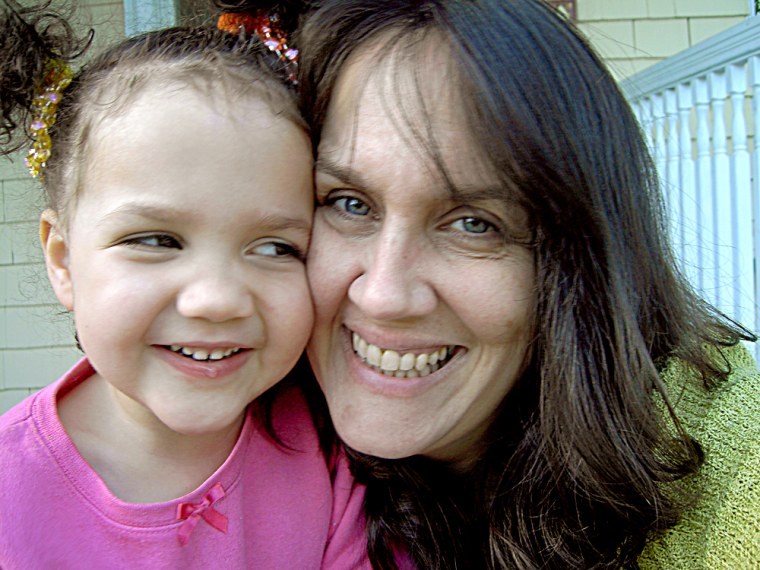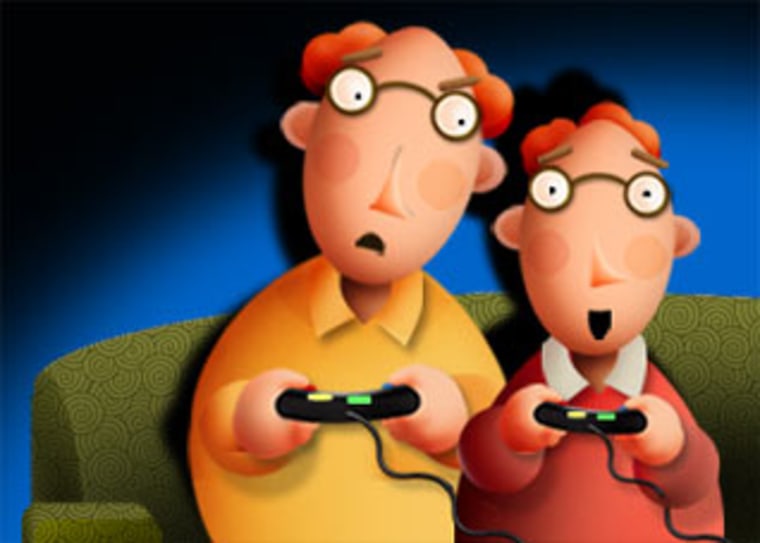Steven Rechtschaffner remembers the day his two sons, ages 17 and 13, discovered the copy of “Grand Theft Auto” he had stashed away in his Vancouver home. “It was weird at first,” Rechtschaffner recalled. “But it forced us to talk about the game. It was me asking, what did you think?”
Geneviève Lord faced a similar episode when her two sons, ages 15 and 11, returned home with a violent video game she didn’t approve of. “I told them, ‘look, this may be a game, but people act like that.’”
Sound familiar? These two episodes have a twist. Both parents are video game industry insiders. Rechtschaffner is a vice president and executive producer for game publisher giant Electronic Arts. Lord is a producer for game maker Ubisoft's Montreal office.
As the video game industry grows up — in employment age at least — more and more employees are facing the same dilemmas as their non-industry peers in managing what their children are exposed to when they play games.
These parents know a thing or two about video games, however, and their experiences may be helpful to any frazzled parent struggling with game-crazy kids.
Managing the media minefield
The summer of 2005 was not kind to video game fans. There were those hidden sex scenes in “Grand Theft Auto: San Andreas,” frenzied hearings chaired by Sen. Hillary Clinton on video game ratings and more studies on the effects of violent video games.
In the face of this unstoppable Fifth Column, parents have been portrayed as either helpless or, as one study commissioned by a European game industry group found, ignorant to the point of irresponsibility.
Surely there must be some parents who care? I looked for the ones who should know better: the game creators.
“The problem with video games is the name,” explained Rechtschaffner. “The word 'game' implies that it’s just for kids.”
According to the Entertainment Software Association, an industry lobbying firm and data clearinghouse, 55 percent of frequent console game players are over 18. Twenty percent are over 35.
For Rechtschaffner, a producer whose credits include the "SSX" snowboard series and "NBA Street," a more appropriate descriptor for video games when it comes to deciding what his sons can or cannot play is "media."
"I treat games like I treat DVDs," he said.
Game professional and mom Brenda Brathwaite follows the same practice in her home.
"If parents can't imagine setting their kid in front of "Scarface" or anything by Tarantino, then how can they consider "Grand Theft Auto" as an alternative?"
Brathwaite, a game designer for CyberLore studios, knows a thing or two about adult-style gaming. She was game designer for 2004’s M-for-Mature rated “Playboy: The Mansion” video game. And she is the co-founder of a sex in video games Special Interest Group (SIG).
“Having made the Playboy game, I know that the excuse some give that, ‘It’s just a game and completely innocent,’ isn’t true,” she said.
Brathwaite is an outspoken critic of the perceived inability of parents to manage their children's game playing time.
Referencing the uproar over the "Hot Coffee" code modification that allowed owners of the PC version of the "M-for-Mature"-rated “Grand Theft Auto: San Andreas” to access hidden sex scenes, Brathwaite was mystified.
"When Hot Coffee erupted into a big story I was wondering why all the parents were irate," she said. "What are you doing with the game in the first place?"

To guide her decisions, Brathwaite follows the industry ratings system, the Entertainment Software Ratings Board, which embosses letter grades ranging from "E-for-Everyone" to "AO - Adults Only" on off-the-shelf video games.
She also enjoys playing “Katamari Damacy,” an all-ages game, with her five-year-old daughter. Everything else is kept hidden.
"At our house I have a console for my games," she said. “I have my own office. And she knows that when Mommy’s working she can’t come in.”
Tin Guerrero, a creative director for game maker Z-Axis, also keeps his own video gaming time private; he uses his two daughter's nap time to catch up on the latest releases.
Interviewed via e-mail, Guerrero wrote, "I never play any violent games or anything that will leave unwanted indelible images while my girls are around – this includes racing games (car crashes) and shooting games of most kinds.
"I figure that I am, like my neighbor, in that ever-shrinking minority of parents that attempt to understand what media is going into their kids' eyes and ears."
Starting a conversation
Eventually some games have a way of ending up in the living room. But rather than duck their head in the sands or ban the game outright, some game professionals say they attempt to use the controversy to stimulate conversation.
Rechtschaffner remembers when he purchased “Golden Eye: 007,” a popular and critically acclaimed video game based on the exploits of James Bond.
“It was the first first-person-shooter for our family console. And you’re shooting people. We talked about how it was being portrayed as a game and a sport.
“Anytime one of my talks turns into a lecture, [my sons] ignore me automatically," he said. "But it’s nice to get a temperature check on them.”
“Golden Eye: 007” also made an impact in the home of Matthew Ford, a game developer who lives with his wife and 10-year-old son in Australia.
In an e-mail to MSNBC.com, Ford explained the dilemma: “I did not think he was ready for the concept of why it’s sometimes okay to sneak up behind a security guard, in his own country, and shoot him in the back of the head, because he was working for an uncontrolled party in possession of a dangerous weapon.”
Ford, a former lead program manager for the PC online role playing games “Asheron's Call” and “Asheron's Call 2,” described his professional vocation as making games that "explore themes of good and evil, and help people appreciate both the power and fragility of good deeds."
Ford and his son have explored these themes together.
He let his son, then eight, play “Dungeon Keeper,” a PC game where the player acts as an evil dungeon master because, explained Ford, he felt his son had a solid grasp on satire and irony to understand that the dungeon master's deeds were “obviously over the top.”

“As a result we had several very good conversations about what defines evil, why doing evil things can be attractive, and why it can be fun to act out in a game, even though to do that in real life would be wrong.”
“Fable,” the M-for-Mature role-playing game where players can opt between good and evil deeds in a quasi-medieval world triggered discussions that, said Ford, “taught me as much as him.”
“I'm certain that I'd not have had these opportunities to hold his attention on these matters and get him really thinking without these games to provide the glue.”
Parenting first, gamer second
Not all parents can engage in the existential dilemmas posed by a video game. Nor would the majority want to — especially those busy parents who don't know the difference between Nintendo's Mario and “Grand Theft Auto's” Tommy.
Game professionals have an advantage in that they love the medium and that they value the time they spend playing video games with their kids, seeing it as a time to bond, communicate and learn from their children.
At Lord's home in Montreal, video game playing is the main living room activity. “We have a big room with TV and controllers We don’t go into the corners to play,” she said.
Rechtschaffner enjoys playing sports games against his sons. “I’m half ashamed to say that my kids and their friends have been a testing group for me," he said. "It’s always fun to see what they like and they don’t like.”
If there's one thing that all parents interviewed agreed upon, it’s that the time spent video gaming be kept at a minimum.
"It’s not about games, it's about media," said Ubisoft's Lord. “Any time that takes attention away from studying is not allowed.”
Ford makes sure that his son, Dylan, uses a digital kitchen timer to track "screen time." Dylan is allowed one hour for every day in school. He can save up hours, but Ford said Dylan usually runs the timer down to zero every day.
At Rechtschaffner’s house, video games are kept to one hour a day. “There’s so much other stuff I’d like to get to as part of the balance,” he said.
Still, he said, he'd rather have his kids play video games then watch television.
"In a game you’re going through thought processes, problem solving, learning how to compete, to deal with failure ... so many things you do because you are participating.”
Ford agreed.
“I actually welcome them in my son's life as a fun activity, a workout for the mind, a spur to meaningful conversation, a cathartic experience, and a window into his thoughts and feelings.”
“I wouldn't wish for a world without these vexing forms of entertainment.”
MSNBC's Tom Loftus is the father of a 6-month-old daughter. She has yet to figure out the Xbox.
